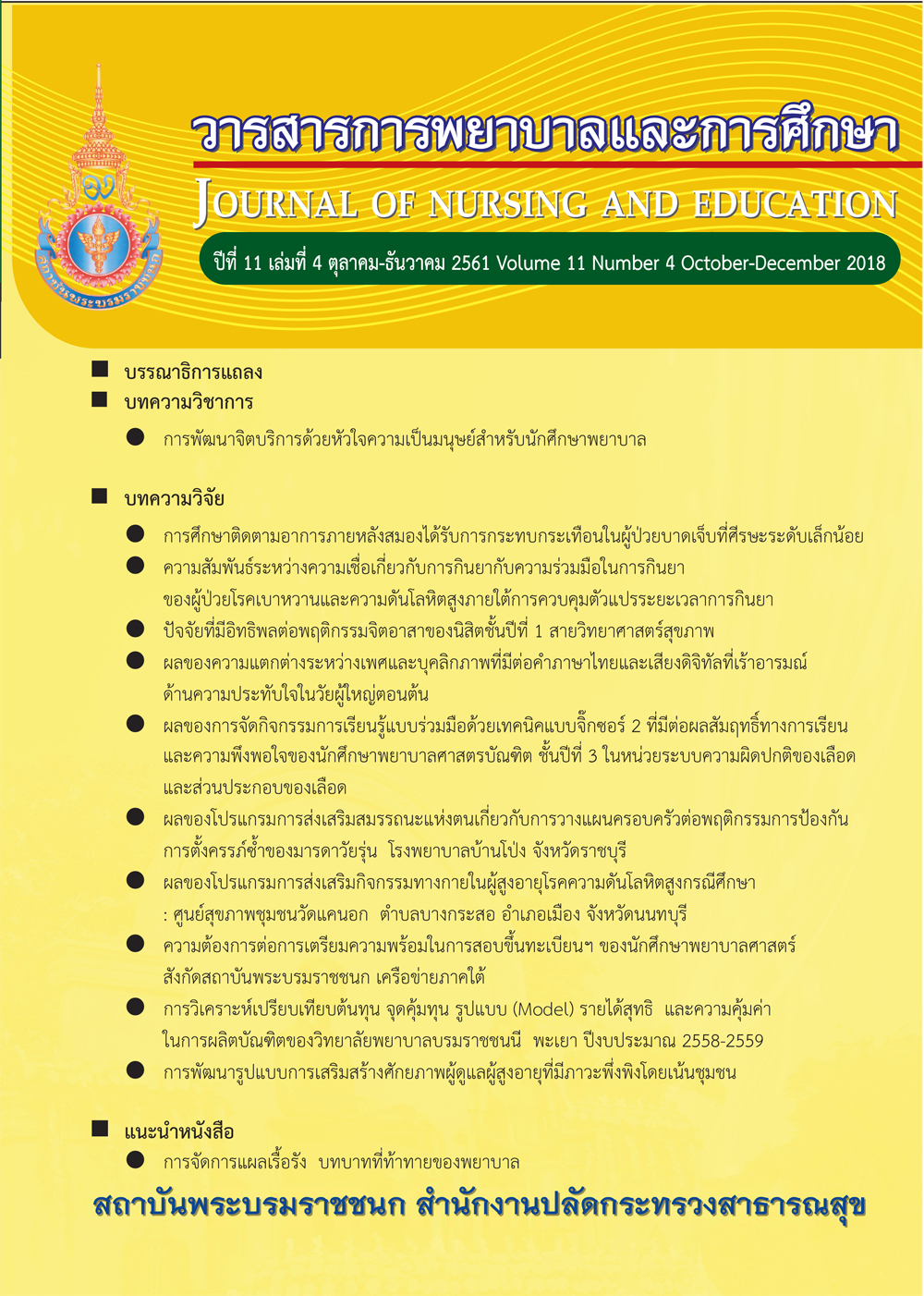ความสัมพันธ์ระหว่างความเชื่อเกี่ยวกับการกินยากับความร่วมมือในการกินยา ของผู้ป่วยโรคเบาหวานและความดันโลหิตสูงภายใต้การควบคุม ตัวแปรระยะเวลาการกินยา
Association between Belief about Medication and Medication Adherence among Diabetes and Hypertensive Patients Controlled by Medication Taking Period
คำสำคัญ:
ความเชื่อเกี่ยวกับการกินยา, ความร่วมมือในการกินยา, เบาหวาน, ความดันโลหิตสูงบทคัดย่อ
ความเชื่อเกี่ยวกับการกินยาเป็นปัจจัยหนึ่งที่มีผลต่อความร่วมมือในการกินยา การวิจัยครั้งนี้ใช้รูปแบบวิจัยเชิงพรรณนาภาคตัดขวาง (Descriptive Cross-Sectional Study) มีจุดประสงค์เพื่อศึกษาความสัมพันธ์ระหว่างความเชื่อเกี่ยวกับการกินยากับความร่วมมือในการกินยาของผู้ป่วยโรคเบาหวานและความดันโลหิตสูงภายใต้การควบคุมตัวแปรระยะเวลาการกินยาของผู้ป่วยโรคเบาหวานและความดันโลหิตสูง กลุ่มตัวอย่างเป็นผู้ป่วยโรคเบาหวานและความดันโลหิตสูงในพื้นที่รับผิดชอบของโรงพยาบาลส่งเสริมสุขภาพตำบลท่าช้าง จังหวัดจันทบุรี จำนวน 400 คน เก็บข้อมูลตั้งแต่กรกฎาคม 2558 ถึง กุมภาพันธ์ 2559 เครื่องมือที่ใช้ได้แก่ แบบสอบถามความเชื่อเกี่ยวกับการกินยาและความร่วมมือในการกินยา วิเคราะห์ข้อมูลโดยใช้สถิติเชิงพรรณา วิเคราะห์ความถี่ ร้อยละ และใช้ไคว์สแควร์สามตัวแปร และทดสอบอิทธิพล
ของผลกระทบด้วยคราเมอร์วี
ผลการศึกษาพบว่า กลุ่มตัวอย่างที่มีระยะเวลากินยา 1- 5 ปีนั้น ส่วนใหญ่อยู่ในกลุ่มรับรู้ความจำเป็น > กังวลจากการกินยา ร้อยละ 69.2 รองลงมาได้แก่ กลุ่มรับรู้ความจำเป็น = กังวลจากการกินยา ร้อยละ 15.6 และกลุ่มกังวล > รับรู้ความจำเป็นจากการกินยา ร้อยละ 15.2 ตามลำดับ และมีความร่วมมือในการกินยาในระดับมาก ร้อยละ 76.8 ขณะที่กลุ่มตัวอย่างที่มีระยะเวลากินยามากกว่า 5 ปีนั้น ส่วนใหญ่อยู่ในกลุ่มรับรู้ความจำเป็น > กังวลจากการกินยา ร้อยละ 76.2 รองลงมาได้แก่ กลุ่มกังวล > รับรู้ความจำเป็นจากการกินยาร้อยละ 14.8 และกลุ่มรับรู้ความจำเป็น = กังวลจากการกินยา ร้อยละ 9 ตามลำดับ และมีความร่วมมือในการกินยาในระดับมาก ร้อยละ 80.4 ก่อนการควบคุมตัวแปรระยะเวลากินยา ความเชื่อเกี่ยวกับการกินยามีความสัมพันธ์กับความร่วมมือในการกินยาอย่างมีนัยสำคัญทางสถิติที่ p < .001 มีค่า effect size .197 (Small Effect Size) หลังควบคุมตัวแปรระยะเวลาการกินยาแล้ว ในกลุ่มที่มีระยะเวลากินยา 1-5 ปี พบว่า ความเชื่อเกี่ยวกับการกินยามีความสัมพันธ์กับความร่วมมือในการกินยาอย่างมีนัยสำคัญทางสถิติที่ p < .05 มีค่า Effect size .175 (Small Effect Size) และในกลุ่มที่มีระยะเวลากินยาที่ระยะเวลา > 5 ปี พบว่า ความเชื่อเกี่ยวกับการกินยามีความสัมพันธ์กับความร่วมมือในการกินยาอย่างมีนัยสำคัญทางสถิติที่ p < .01 มีค่า Effect Size . 258 (Medium Effect Size)
จากผลการศึกษามีข้อเสนอแนะว่า บุคคลากรทางสุขภาพควรมีการประเมินความเชื่อเกี่ยวกับการกินยาในผู้ป่วยเรื้อรังที่กินยาไปแล้ว 1 ปี เพื่อทราบข้อมูลความเชื่อเกี่ยวกับการกินยา ปัญหาและอุปสรรคของการกินยา ตลอดจนออกแบบกิจกรรมการให้ความรู้หรือปรับความเชื่อเกี่ยวกับการกินยาในผู้ที่มีปัญหาของความเชื่อเกี่ยวกับการกินยาเพื่อให้การกินยาได้ผลดี
References
2. Leaungsomnapa, Y., Thasirasawad, P., & Dechavoot, L. Beliefs about Medication: Idea and Association with Medication Adherence. J Prapokklao Hosp Clin Educat Center, 2014; 25(2): 95-105. (in Thai)
3. Bosworth, HB., Granger, BB., Mendys, P., Brindis, R., Burkholder, R., Czajkowski, SM., et al. Medication Adherence: A Call for Action. American Heart Journal, 2011; 162(3): 412-24.
4. WHO. Towards the Solution, Adherence to Long-term Therapies Evidence for Action. Geneva: World Health Organization, 2003. p. 27-38.
5. Horne, R. Representations of Medication and Treatment: Advances in Theory and Measurement. In: Petrie, KJ., Weinman, J., Editors. Perceptions of Health and Illness: Current Research and Applications. London: Harwood Academic, 1997. p. 155-88.
6. Horne, R. Treatment Perceptions and Self-regulation. In: Cameron, LD., Leventhal, H., Editors. The Self-regulation of Health and Illness Behavior. London: Routledge, 2003. p. 138-53.
7. Maguire, LK., Hughes, CM., McElnay, JC. Exploring the Impact of Depressive Symptoms and Medication Beliefs on Medication Adherence in Hypertension - A Primary Care Study. Patient Education and Counseling, 2008; 73: 371-6.
8. Menckeberg, TT., Bouvy, ML., Bracke, M., Kaptein, AA., Leufken, HG., Raaijmakers, JAM., et al. Belief about Medicines Predict Refill Adherence to Inhaled Corticosteroids. Journal of Psychosomatic Research, 2008; 64: 47-54.
9. Schuz, B., Marx, C., Wurm, S., Warner, LM., Ziegelman, JP., Schwarzer, R., et al. Medication Beliefs Predict Medication Adherence in Older Adults with Multiple Illnesses. Journal of Psychosomatic Research, 2011; 70: 179-87.
10. Leaungsomnapa, Y., Promproh, S., Leaungsomnapa, S., Sourthao, Y. Influence of Belief about Medication on High Group of Medication Adherence in Hypertensive Patients. J Prapokklao Hosp Clin Educat Center, 2013; 30(2): 146-57. (in Thai)
11. Tarutani, S., Kikuyama, H., Ohta, M., Kanazawa, T., Okamura, T., Yoneda, H. Association between Medication Adherence and Duration of Outpatient Treatment in Patients with Schizophrenia. Psychiatry Investic, 2016; 13(4): 413-9.
12. Horne, R., Weinman, J., Hankins, M. The Beliefs about Medicines Questionnaire: the Developments and Evaluation of a New Method for Assessing the Cognitive Representation of Medication. Psychology and Health, 1999; 14: 1-24.
13. Leaungsomnapa, Y., Promproh, S., Leaungsomnapa, S., Thasirasawad, P., Keawchaum, R., & Suraworawathanakul, W. Confirmatory Factor Analysis of Beliefs about Medicine Questionnaire in Thai Version. J Prapokklao Hosp Clin Educat Center, 2014; 2014: 297-310. (in Thai)
14. Horne, R., Weinman, J. Self-regulation and Self-management in Asthma: Exploring the Role of Illness Perceptions and Treatment Beliefs in Explaning Non-adherence to Preventer Medication. Psychology and Health, 2002; 17(1): 17-32.
15. Clatworthy, J., Bowskill, R., Parham, R., Rank, T., Scott, J., & Horne, R. Understanding Medication Non-adherence in Bipolar Disorders Using a Necessity-concern Framework. Journal of Affective Disorders, 2009; 116: 51-5.
16. Gravetter, FG., Wallnau, LB. The Chisquare Statistis: Tests for Goodness of Fit and Independence [online]. n.p [cited 2017/3/18]. Available from: https://www.slideshare.net/jasondroesch/gw-e8ch15
17. Jaiyungyuen, U. Factor Influencing Health-promoting Behavior of Patients with Hypertension. Journal of Nursing and Education, 2009; 2(1): 39-47. (in Thai)






